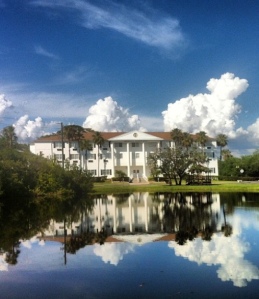 Yesterday marked the one year anniversary of the closing of Clearwater Christian College. The board lacked the courage to continue operations and lost the vision of the college’s founder, Arthur Steele, to see a liberal arts Christian college that would impact the greater Tampa Bay Area and beyond. The result scattered thee hundred and fifty students and left over sixty faculty and staff without employment.
Yesterday marked the one year anniversary of the closing of Clearwater Christian College. The board lacked the courage to continue operations and lost the vision of the college’s founder, Arthur Steele, to see a liberal arts Christian college that would impact the greater Tampa Bay Area and beyond. The result scattered thee hundred and fifty students and left over sixty faculty and staff without employment.
Throughout these past twelve months, I have said little publicly about it mainly because the abrupt ending and severe casualties created by the decision left me bewildered. My wife, Julianne’s joblessness overlapped my first three months of unemployment. We had little time to think about much beyond financial survival. Many of my co-workers, like myself, found ourselves in a wilderness asking questions, listening to insufficient answers to our situation, mourning the death of the college that we loved so much. In September after the closure, I took to bike riding several times a week partially to work through the CCC event and try to understand what God is doing. My rides were sometimes with friends and sometimes alone, but always in Starkey Wilderness Park. I felt drawn to this location because of my own wilderness in which I found myself. After twelve months, I still have little to say about what happened to bring about the closure, but I have learned many things through my journey in the wilderness. Here are a few:
I experienced inconsolable pain of loss and found the hope of the gospel to be a balm. Reflecting on Christ and his work for me has provided so much comfort this year. There have been many dark moments this year. In those moments, I have tried to focus on what Christ did to reconcile those who are believing in his work -his life, his death, his resurrection, his ascension, his ruling at the right hand of the Father. When I rejected the notion that my own situation was unrepairable, it was because I realized in reflecting on Christ that nothing is beyond this divine work. I hoped in his completed work to see me through.
I experienced the silence of the church when I needed them to speak truth to me. Times during this past year I needed to hear from the church, I heard nothing except questions and data inquiry. Trite sayings about God’s sovereignty were followed by questions about CCC’s closing that made the pain press in on me. I’m sure these moments were unintentional and out of a pure heart, but I most wanted them to sit in silence with me or read healing truth of scripture to me.
I experienced the care of church friends in moments I needed it most. This may sound contradictory to the statement above, but it is not. In the three years I have been attending my current church, God has provided me friendship with several men in the church. Particularly in the initial stages of the journey, without perhaps their realization, God allowed these men to minister to me in ways they still do not know.It seemed when I was in very dark places spiritually, they would call, inviting me to lunch. I remember sitting at lunch with them one time and thinking they have no idea how dark of a place their friendship rescued me from by a simple gesture of kindness. They would talk to me about scripture, they would encourage me, remind me they were praying for me and my family, and ask how they could help.
I experienced the power of hearing the scriptures read to me. This was powerful for me because I realized the Spirit was guiding other believers to read what I needed in that moment. I was not trying to find something for me, I was being ministered to by the Holy Spirit through other friends and family who were also trusting in Jesus. My wife did this often for me. I can’t begin to tell you how this impacted my view of the situation.
I experienced how to listen for the comforting voice of the Holy Spirit. I have spent a significant amount of my time sitting in silence, driving in silence or riding my bike in silence – no music, podcasts, or radio. At first I was trying to figure out what happened, but that quickly became a pointless endeavor. I began to pray that God would through the power of the Holy Spirit clear away unhelpful emotions that prohibit me from hearing from him. Through this I learned how to sit in a prayerful spirit and hear from God. I began to read and meditate on his word and ask the Holy Spirit to do His work on me.
I experienced loss which has created a greater sense of empathy for those who have suffered greater loss. The Lord blessed our family with significant employment until two years ago. Julianne lost her job one year to the date that I lost mine at CCC. By God’s grace on us, we were able to weather the storm better than some of my co-workers. However in the midst of this, God allowed us to experience gifts that we could never repay. One such gift was the private school tuition of my son’s junior year paid in full. My gratefulness cannot even be expressed in this one event, someone relieved us of the additional stress of figuring out where he would have to complete the next year of high school. There were many others too, some in help doing things others in material contributions. I now see more clearly the hurt of others around me that perhaps I could not see without this happening. I find myself praying more for those around me that I sense are experiencing pain inflicted by others.
I experienced loss of professional identity which allowed me to focus on my true identity in Christ. I am no longer a Professor of Bible at CCC. I loved that title mainly because of all the great things identified with it- teaching the Bible, mentoring students, preaching the word, etc. Now I am a “school bus driver” (SUV) for my children, domestic worker, and afternoon/night courses adjunct instructor. That is my work, not my identity. Through this year, I have been reminded through the scriptures and the Holy Spirit, that I am in Christ. I am his child, I am a son of God adopted through Christ’s work. That is enough, nothing else matters.
I experienced God turning the hearts of men to care for his children. My superiors at my current employment contacted me soon after the closure about adjunct work. They had a sense of duty to take care of me because of the abruptness and “lack of care” (their words) of the closing institution. I was and continue to be given courses well beyond what is normal for a new hire adjunct. God has provided the max number of course I can teach at this institution without becoming full-time. One of my superiors called me prior to the spring semester and told me “God is really taking care of you because this never happens.” Unbelievers confessing the true nature of God’s goodness for his people.
I experienced God’s goodness to me in the little things. Soon after the CCC’s closure, I realized my Red Sea moment might not come right away. For multiple reasons, I was not going to find the ministry opportunity that helped make sense of the CCC event. This has been a gift because through it I forced myself to start journaling ways in which God showed up in my day to day routine. Very soon in this process, I began to see Divine appointments that resulted in encouraging words. Little things, formerly interesting but thought of as insignificant now reminded me that God was with me and caring for me. This “show up” journal became encouraging reads when I would doubt the goodness of God or the greatness of my Savior.
I don’t like what has happened, I don’t understand it any more now than I did a year ago. I want to wake up from this nightmare that there is not liberal arts Christian college in the Greater Tampa Bay area. There will be no more interns from CCC being salt and light in the public schools, and local businesses. There will be no more CCC student praise and worship on the beaches that display God’s transforming work in this world. However this is what God has allowed in his good providence. I accept that and I am grateful that through it He has graciously shown me how big He really is and how much He loves those who are trusting in Him. The doors have closed, but as many of the student’s have proclaimed on social media, WE are Clearwater, the ministry that happened there does not cease to be because the halls are silent.



